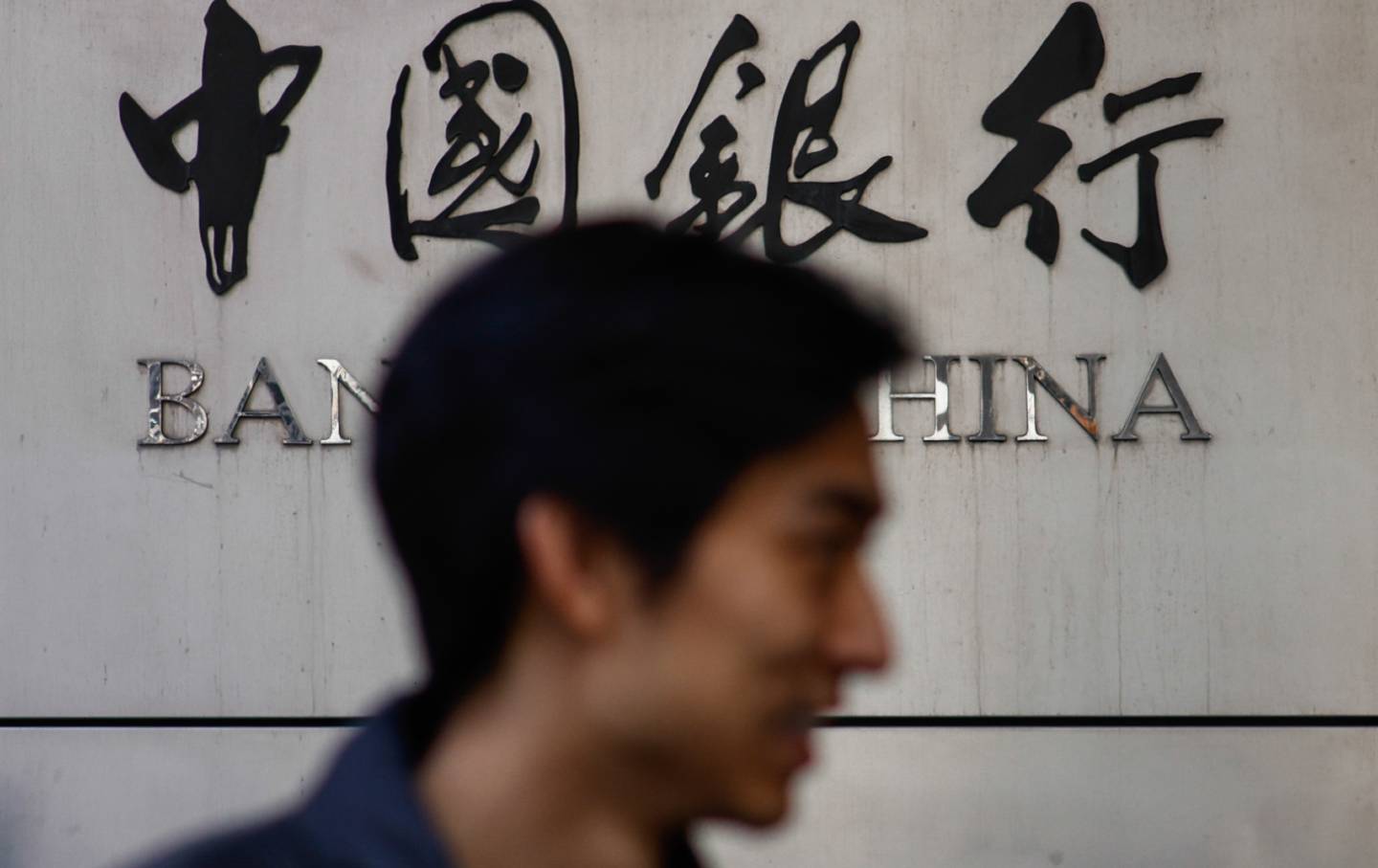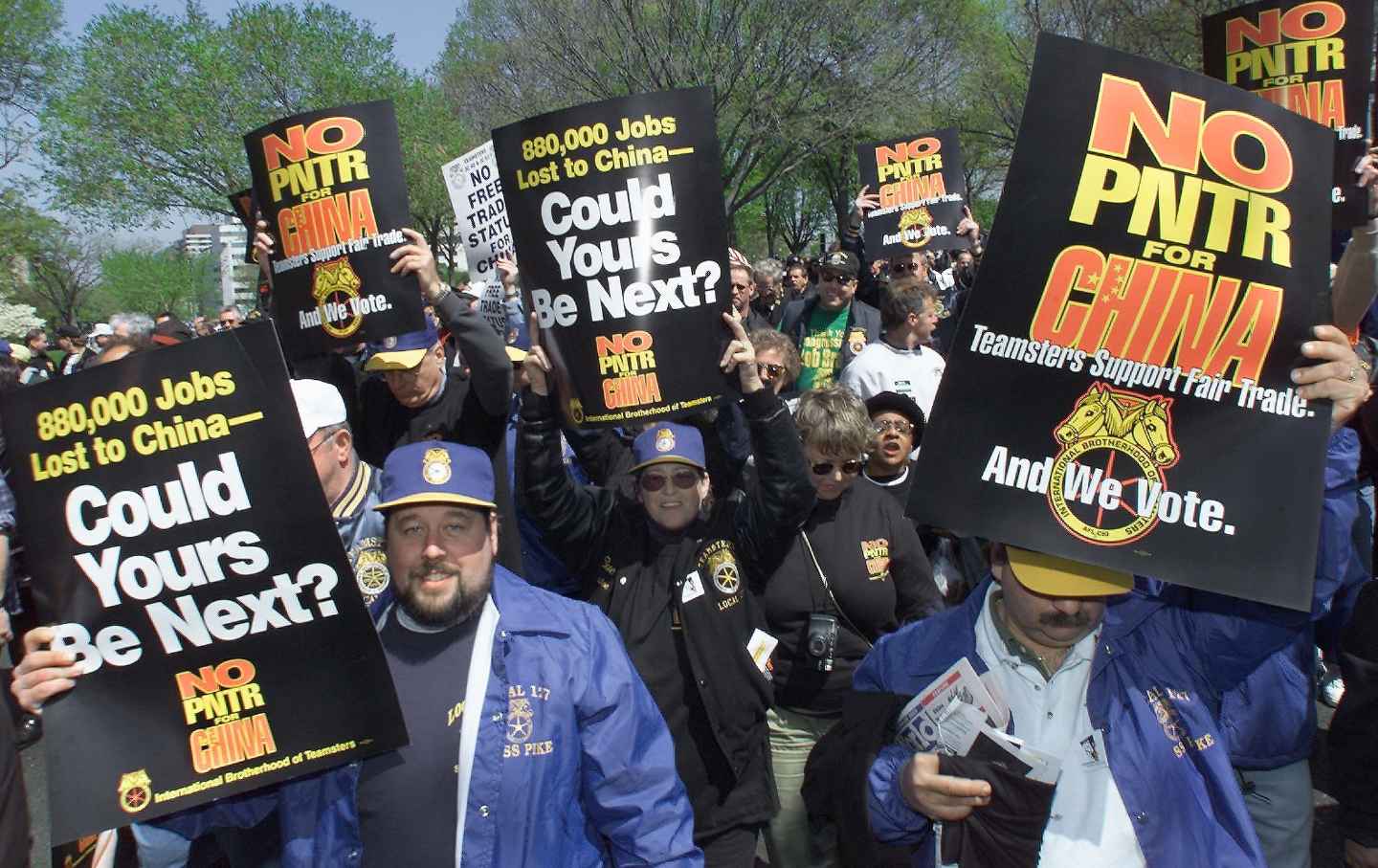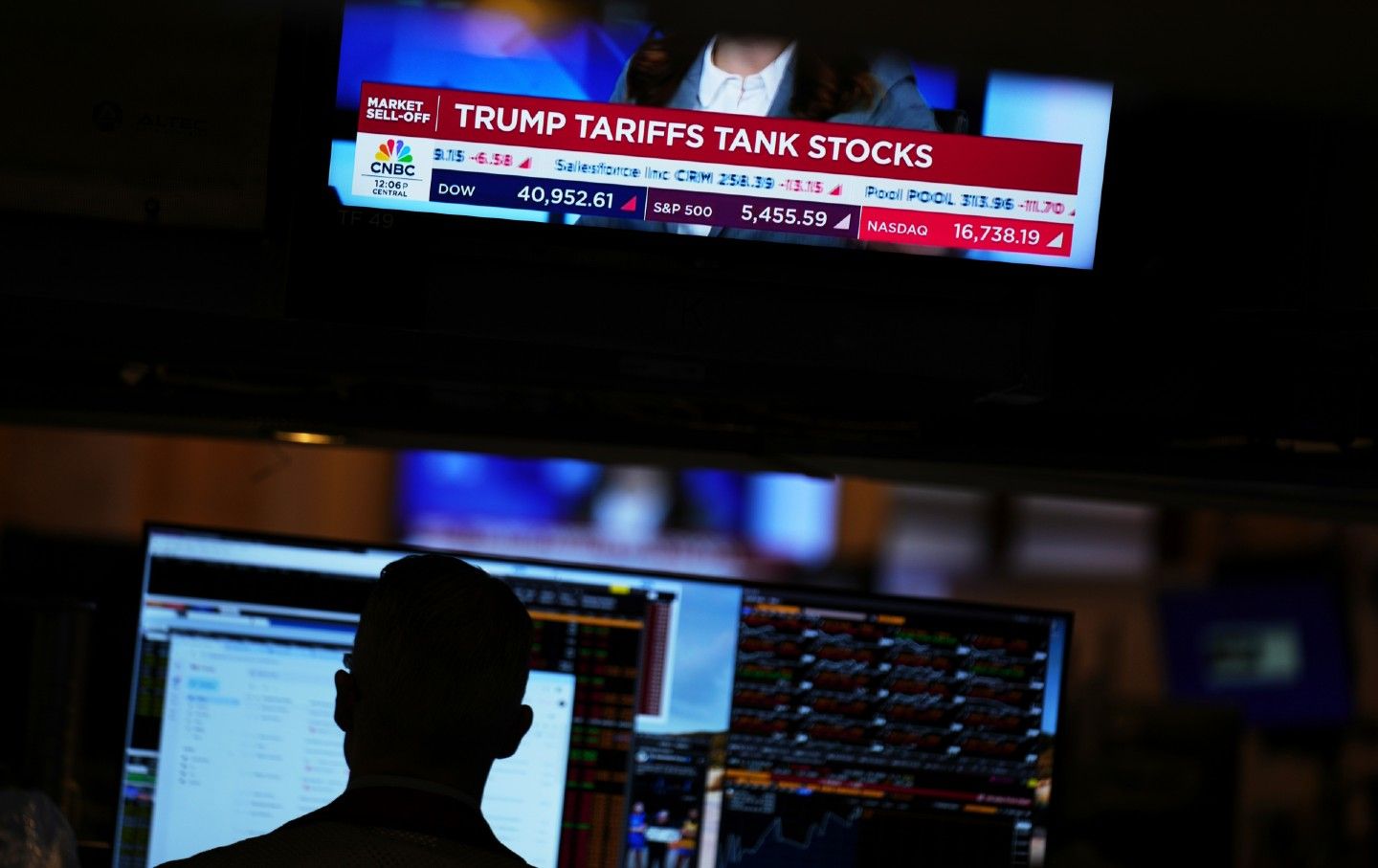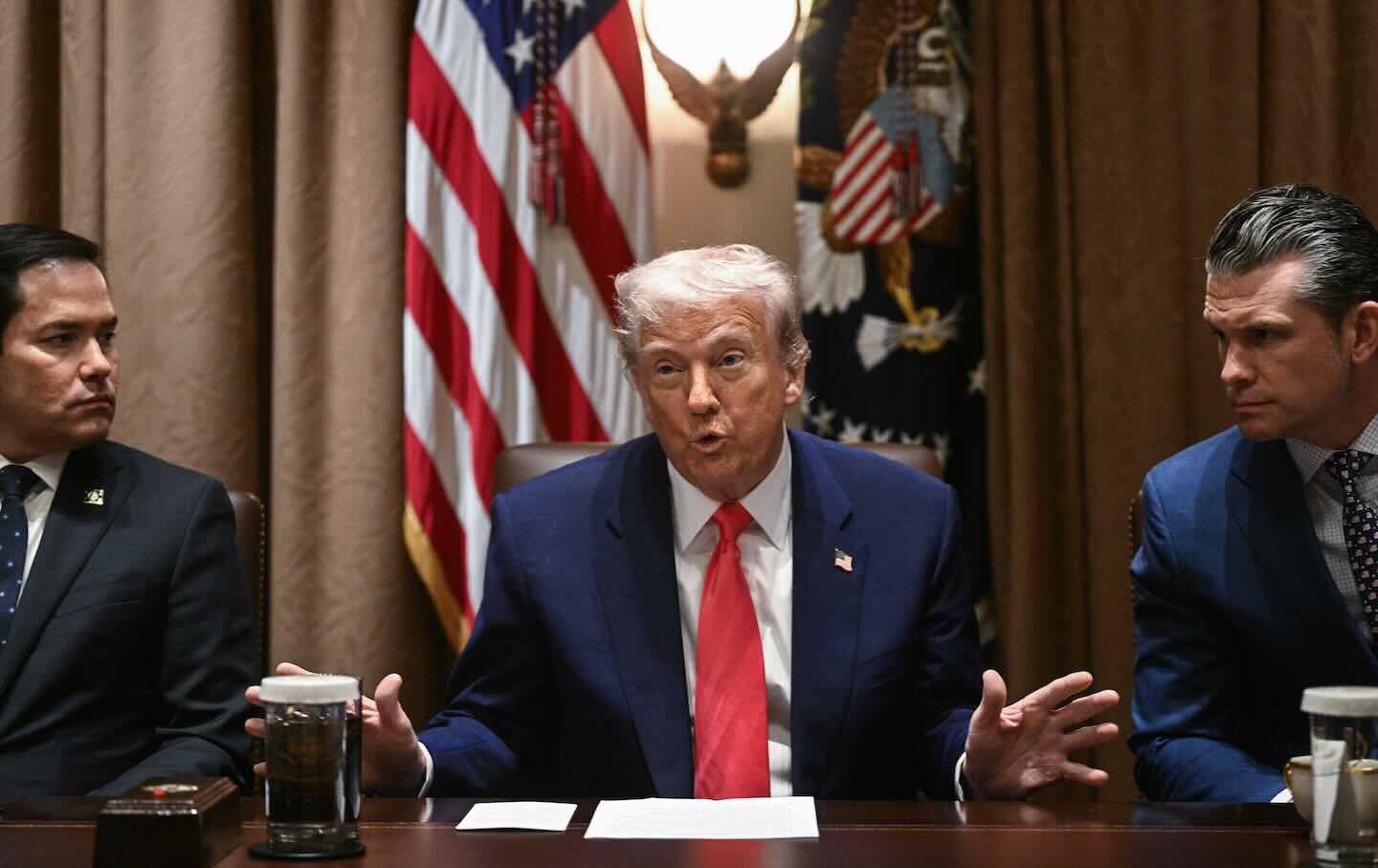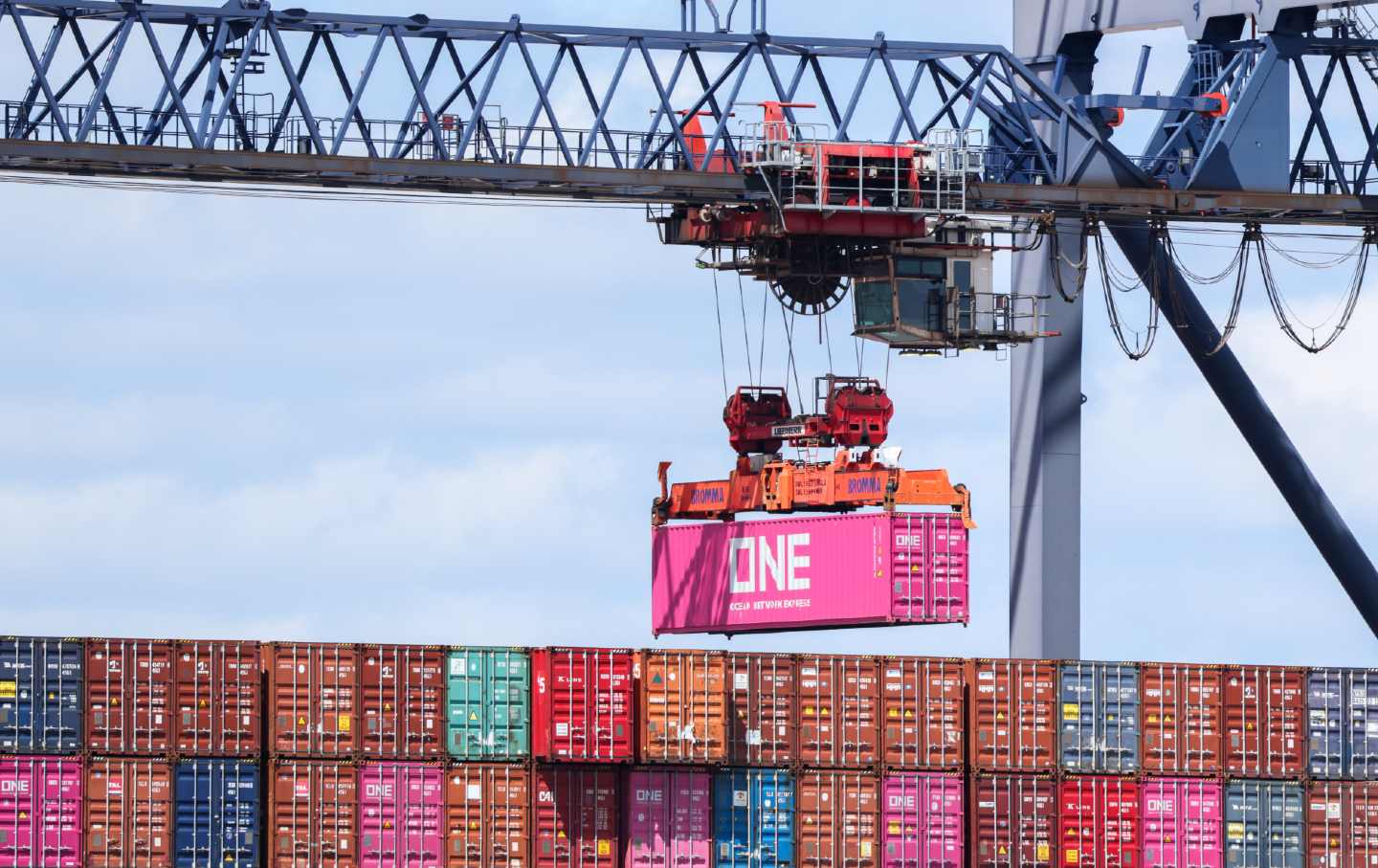A Trade Catastrophe Could Be the Thing That Finally Tears the GOP Apart
The fallout from Trump’s tariff plans has pitted the Republican financial elite against MAGA culture warriors in a way that threatens to split the coalition.
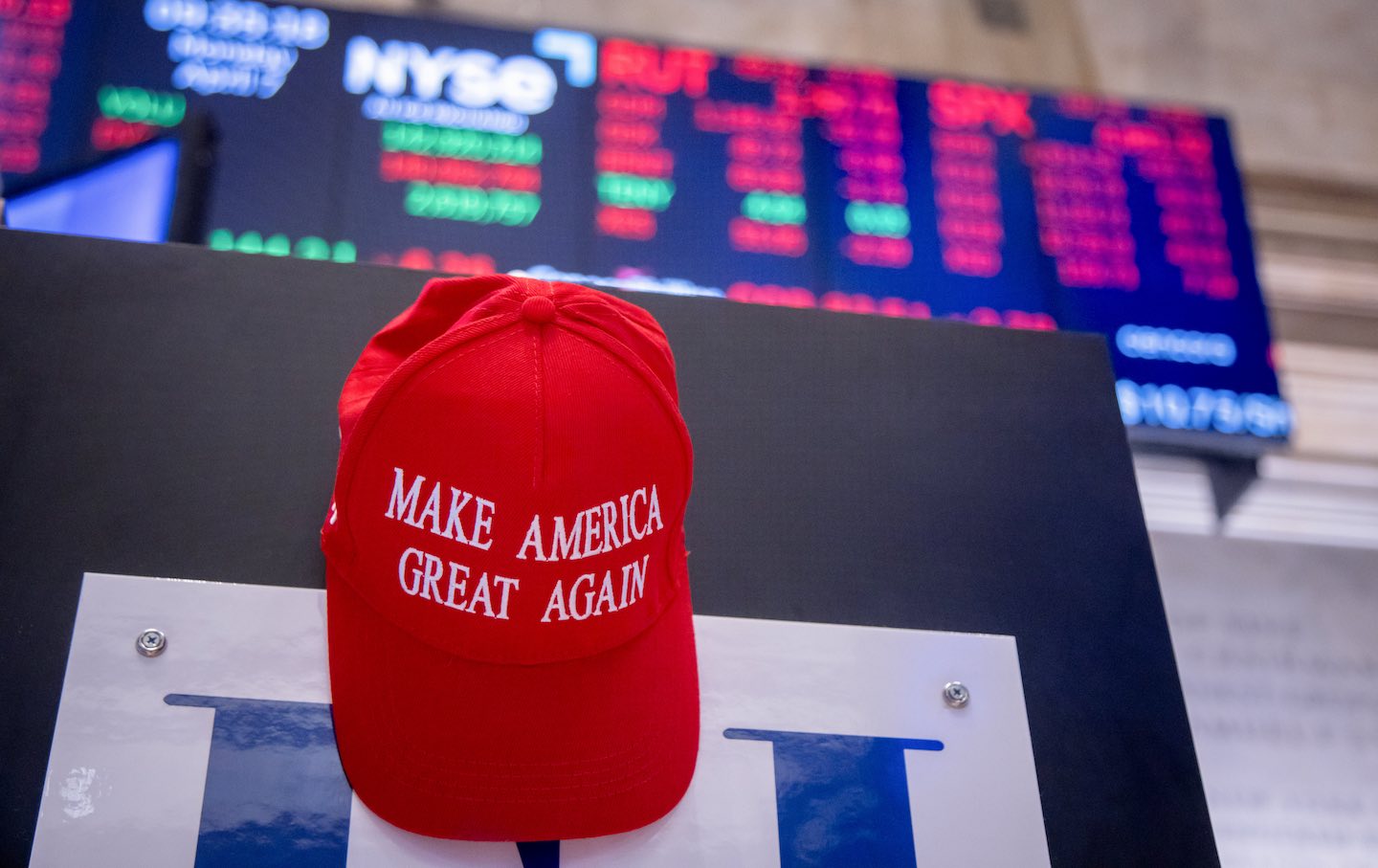
A MAGA hat on the floor of the New York Stock Exchange on Monday, April 7, 2025.
(Michael Nagle / Bloomberg)
Just hours after exhorting everyone—most especially, one imagines, the lords of Wall Street—to “BE COOL” and serenely await the dawn of a new economic golden age, Donald Trump abruptly reversed course and announced a 90-day pause on his fraudulent and batshit tariffs plan. Trump’s turnaround was announced on his Truth Social account; during the pause, he wrote, tariffs would be reduced to 10 percent—the original baseline for all US trading partners.
The announcement seems to have achieved its intended effect of briefly reviving financial markets from the historic swoon they had spiraled into in the wake of last week’s “Liberation Day” ceremony. Goldman Sachs, which had issued a forecast of a likely recession, promptly walked back that call upon news of the three-month pause. (The actual revised forecast still places the arrival of a recession at a 45 percent likelihood, and anticipates stagnant GDP growth, so happy days aren’t exactly here again.) Meanwhile, vocal detractors of the new tariff order like hedge fund manager Bill Ackman seamlessly took up their prior Great Leader refrains, hymning Trump’s expert cunning in outwitting the hostile world of global finance capital. But there remains a great deal of uncertainty in the finance world over US trade policy–most notably in the flight from Treasury bond markets, the traditional safe haven for investors in times of crisis; the bond slump is what reportedly triggered Trump’s reversal, and it appears not to be letting up, at least in the short term.
But regardless of market divagations, the respite offered by Trump’s hastily announced tariffs pause may well be something of a mirage, as far as the fate of the new MAGA governing coalition is concerned. Wednesday’s news, after all, came on the heels of two prior market lurches into wishful trade thinking, based on virtually no actionable evidence. On Tuesday, the unprecedented stock market slide triggered by Trump’s tariffs plan briefly abated after vague and ultimately unsubstantiated reports that Trump would be open to negotiating new trade accords with countries now contending with steep American import taxes.
Tuesday’s market breather followed hard upon a much more demented—and hence, these days, far more representative—minutes-long spike on Wall Street in the wake of a phony X report from a troll account that Trump would be announcing a 90-day pause on the tariff package. That brief foray into broker bliss indecorously crashed when the White House announced that no such pause was in the offing. The investor beatings would continue, in other words, until morale was broken.
While Trump was apparently cornered into backing down by the sustained siren-wail of global market distress, there’s no evidence that his broader commitment to sweeping trade sanctions—arguably the only stable belief he’s maintained over the past four decades—will give way to the status quo ante. Indeed, even as he announced the broader tariffs pause, he declared that new 125 percent tariffs would be slapped on Chinese exports to the United States—a perverse punishment for a country that was seeking to respond in kind to Trump’s own trade salvos. What’s more, anyone scrutinizing Trump’s pause for a fundamental change in policy orientation was immediately defeated by its utterly ludicrous logic.
Trump said the pause was designed to reward the non-China countries who hadn’t yet imposed steep retaliatory tariffs on the United States—the “more than 75 Countries have called Representatives of the United States, including the Departments of Commerce, Treasury, and the USTR, to negotiate a solution to the subjects being discussed relative to Trade, Trade Barriers, Tariffs, Currency Manipulation, and Non Monetary Tariffs, and that these Countries have not, at my strong suggestion, retaliated in any way, shape, or form against the United States.” In other words, the countries that fell into line with Trump’s wishes under the week-long duress of coercive tariffs are being unshackled from the measures that brought them to heel. Meanwhile, the United States’ principal trade rival on the global stage is being further punished for behaving just as a nation targeted by punitive tariffs is supposed to. Oh, and Trump is also leaving the 25 percent tariffs imposed on Canada and Mexico intact, which means we still have steep tariffs on our top three trading partners—and will face widespread inflation in basic supply chains that will chiefly be passed on to consumers.
This backward-spooling reasoning is evidence of many things, no doubt, but the efficacy of tariffs in leveling global market access—let alone stoking a full-fledged domestic manufacturing revival—isn’t among them. And while the masters of the paper economy may be relieved by a cessation of America’s self-inflicted race to the bottom, the deeper fissures within rightwing politics exposed by the fallout of Liberation Day will only deepen over the long haul. The manifest desperation of Wall Street players to believe that they live in a different world than the one their hand-picked candidate has fashioned for them does bespeak real political trouble on the right. Since the advent of the Reagan coalition 45 years ago, the conservative movement has been a marriage of convenience between the GOP’s traditional moneyed elite and a restive base of true-believing culture warriors. At times, as with the rise of the Tea Party movement, it appeared that the Kulturkamp partisans were ripe for defection, particularly when the elite’s anointed presidential candidate, Mitt Romney, performed so badly in the 2012 elections.
Trump’s hostile takeover of the GOP managed to patch over many of the deeper rifts between the two right-wing camps—which is why, on the strength of massive tax cuts, and a long train of corrupt bargains with big-money backers, the GOP’s financial elite has been so accommodating to Trump’s immigration inquisitions, assaults on free speech and free association, and even his penchant for tampering with the bottom lines of private universities and law firms. In the mindset of the big-ticket investors who back the Republicans, these are all just heightened forms of the original Faustian bargain their Reaganite forebears struck with the conspiratorial speculators and righteous inquisitors of the original evangelical right.
But on the other side of the political bargain, it’s always been incumbent on Republican leaders never to transgress against the basic market prerogatives of the investor class. So Wall Street’s rejection of tariffs isn’t so much an unwarranted expression of surprise at Trump fulfilling his campaign pledge to come down hard on trading partners that he believes, without any intelligible evidence, are “ripping off” the United States. No, it’s a broader and deeper expression of shock over the Trump administration’s casual disregard of the tacit social contract that’s governed right-wing politics in America for nearly half a century.
Indeed, the distemper is already spreading far beyond the hothouse infirmary of Wall Street. The first court challenge mounted to Trump’s plainly bogus invocation of emergency powers foolishly bequeathed by Congress has come from a group called the New Civil Liberties Alliance—an organization that’s received funding from archconservative donor Charles Koch and Federalist Society honcho Leonard Leo. The alliance is coordinating the suit with a Florida-based home goods company called Simplified, which alleges economic harms from the high new tariffs on Chinese imports. The complaint in the suit alleges, correctly, that the fentanyl epidemic, which Trump cites as the chief reason for claiming sweeping emergency powers over tariffs, is simply unrelated to the wide-ranging imposts announced last week. “The means of an across-the-board tariff does not fit the end of stopping an influx of opioids, and is in no sense ‘necessary’ to that stated purpose,” it reads in part. “In fact, President Trump’s own statements reveal the real reason for the China tariff, which is to reduce American trade deficits while raising federal revenue.”
It’s more than a little bracing to see a group affiliated with Leonard Leo asserting strict curbs on executive power, since the Federalist Society has largely devoted itself to the maximum expansion of an imperial presidency designed to advance the policy aims of the right. The Federalist Society has played a leading role in destabilizing the central provisions of the Voting Rights Act, striking down the most basic curbs on moneyed influence in our politics, and dismantling both the legal foundation and operational ambit of federal regulation, just for starters. And that’s to say nothing, of course, of handpicking the decisive three Trump appointees who have secured a ruinous right-wing majority on the US Supreme Court for decades ahead.
There’s a very cogent reason for a Leo-aligned advocacy concern to come out swinging against the Trump tariffs. That reason’s name is Barre Said, a Chicago-based industrial magnate who handed over $1.6 billion to Leo’s Marble Freedom Trust, the dark-money operation that funds the Federalist Society, together with Leo’s growing network of right-wing influence groups. Like any right-wing billionaire, Said has business interests tightly bound up with the existing array of plants, supply chains, and labor markets that seamlessly deliver profits to global investors.
Popular
“swipe left below to view more authors”Swipe →David Daley, who charts the rise of Leo and the Federalist Society to the summit of power in his recent book Antidemocratic, argues that the new court move will likely prove a critical test for the legal institutions Leo has corralled into the right’s model of plutocratic governance. “The far-right judiciary has two daddies: Leonard Leo and Donald Trump,” he says. “A lifetime of fealty to Leo earned them lifetime appointments from Trump. Thus far, on every case that matters, the robed partisans have delivered for both.… Let’s be clear: John Roberts and this court not only made Trump’s second term possible, but their reckless immunity decision enabled him to behave like a king. Yet this court exists to reward the billionaires that fund the Federalist Society and the justice’s own luxury vacations. If, to paraphrase Dylan, you gotta serve someone, the Devil or Leonard, my money’s on the conservative movement judges dancing with the ones that brung them.”
The distress of the GOP’s billionaire caste is so pronounced that it has trickled down to the unlikeliest organ of Trump dissent: the GOP-controlled Senate. Indeed, the same day that Trump unveiled his new tariff scheme, the Senate approved a measure that would reverse Trump’s earlier tariffs on Canada. And Charles Grassley, the ultrasenior conservative stalwart from Iowa, has teamed with Washington Democratic Maria Cantwell to belatedly reassert some of Congress’s atrophied authority over tariff making, by requiring congressional approval for all new tariffs within 60 days. To no one’s surprise, Trump has vowed to veto both measures, should they reach his desk.
It’s far from clear whether any of the present jousting in the courts or the Senate will succeed in even minimally walking back the GOP’s greatest self-imposed economic calamity since the Great Depression. But the tariff battles have already exposed cracks in the Republican coalition that won’t respond to the usual incantations of superior deal-making prowess and economic score-settling ritually invoked by the party’s self-enamored maximum leader. The Republican Party is being reminded, in the rudest possible fashion, that its venerated standard-bearer is a veteran of six personal bankruptcies, including for a casino empire that, under remotely rational management, would have functioned as a license to print money. For all the swagger of the MAGA power elite on Pennsylvania Avenue, its counterpart on Wall Street knows all too well that the new tariff interregnum isn’t going to fix anything for very long.
Hold the powerful to account by supporting The Nation
The chaos and cruelty of the Trump administration reaches new lows each week.
Trump’s catastrophic “Liberation Day” has wreaked havoc on the world economy and set up yet another constitutional crisis at home. Plainclothes officers continue to abduct university students off the streets. So-called “enemy aliens” are flown abroad to a mega prison against the orders of the courts. And Signalgate promises to be the first of many incompetence scandals that expose the brutal violence at the core of the American empire.
At a time when elite universities, powerful law firms, and influential media outlets are capitulating to Trump’s intimidation, The Nation is more determined than ever before to hold the powerful to account.
In just the last month, we’ve published reporting on how Trump outsources his mass deportation agenda to other countries, exposed the administration’s appeal to obscure laws to carry out its repressive agenda, and amplified the voices of brave student activists targeted by universities.
We also continue to tell the stories of those who fight back against Trump and Musk, whether on the streets in growing protest movements, in town halls across the country, or in critical state elections—like Wisconsin’s recent state Supreme Court race—that provide a model for resisting Trumpism and prove that Musk can’t buy our democracy.
This is the journalism that matters in 2025. But we can’t do this without you. As a reader-supported publication, we rely on the support of generous donors. Please, help make our essential independent journalism possible with a donation today.
In solidarity,
The Editors
The Nation


